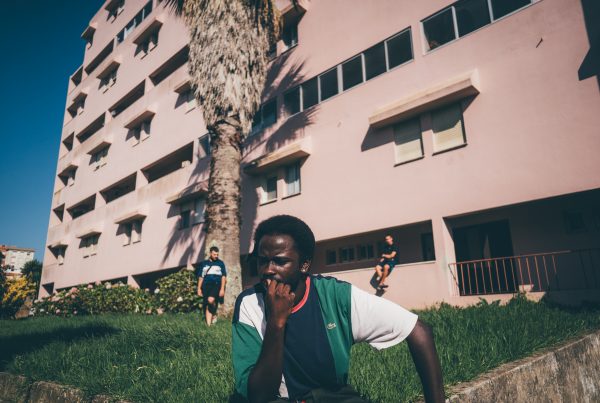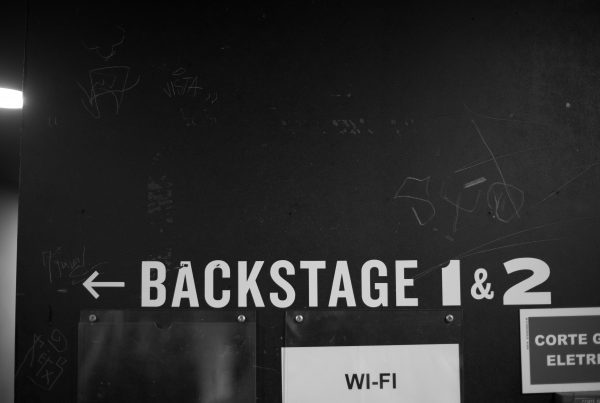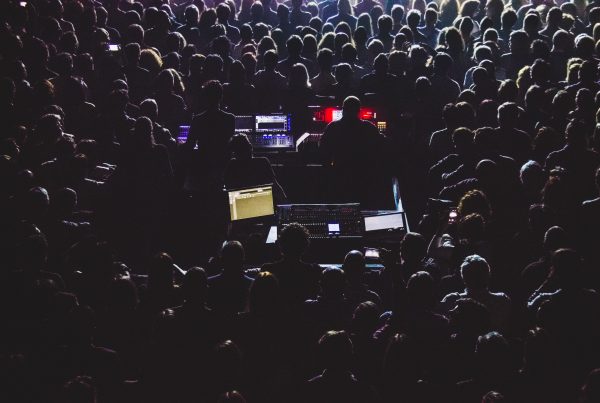Em 2019, a produção artística brasileira contemporânea entrou-nos pela porta adentro como nunca tinha acontecido antes. Em maior quantidade e diversidade, com muita urgência e insurgência, em espaços underground, no circuito institucional e na academia; da música à literatura, do teatro à dança, das artes visuais ao cinema. Vimos gente (a lista é longa, mesmo muito longa) como MC Carol, a funkeira mais punk do pedaço, as cantoras e compositoras Bia Ferreira e Linn da Quebrada, que vieram a Portugal mais do que uma vez no mesmo ano, Conceição Evaristo e Sueli Carneiro, figuras maiores da literatura afro-brasileira e do movimento negro brasileiro, ou, nas artes performativas, Grace Passô, Cia. Hiato, Alice Ripoll, Anti Status Quo Companhia de Dança e Coletiva Ocupação, com espectáculos poderosos e profundamente inspiradores.
Tudo isto aconteceu num contexto particularmente fervilhante e simbólico: não só de luta e resistência contra o regime de extrema-direita de Jair Bolsonaro, mas também num momento em que há cada vez mais brasileiros a viver em Portugal (são mais de 100 mil). Entre estes imigrantes encontra-se uma classe artística e politicamente activa que tem vindo, com crescente intensidade e presença nos últimos dois anos, a semear o seu lugar no circuito cultural independente português, com foco em Lisboa e no Porto, e a revigora-lo com outros corpos, outras linguagens e saberes, outras pluralidades e possibilidades.
“A imigração brasileira em Portugal é hoje mais diversa do que nunca”, nota Cyntia de Paula, presidente da Casa do Brasil, associação sem fins lucrativos sediada em Lisboa que trabalha, desde 1992, na área dos direitos das comunidades imigrantes. A nova vaga migratória, que se acentuou em 2018, é composta “por diferentes perfis e classes sociais” (tanto pró como anti-Bolsonaro), incluindo vistos gold, aposentados, pequenos e médios empreendedores, estudantes, trabalhadores à procura de melhores condições de vida e “muitos artistas”. “Chegam-nos artistas todos os dias à procura de um espaço e estamos sempre a receber emails de artistas ainda no Brasil que gostariam de se mudar para cá e que querem saber como podem entrar no circuito daqui”, conta Cyntia de Paula.
Segundo a presidente da Casa do Brasil, a maioria dos artistas brasileiros que tem chegado mais recentemente a Portugal é declaradamente anti-Bolsonaro. “Vêm para cá também para continuar a fazer resistência através das artes.”
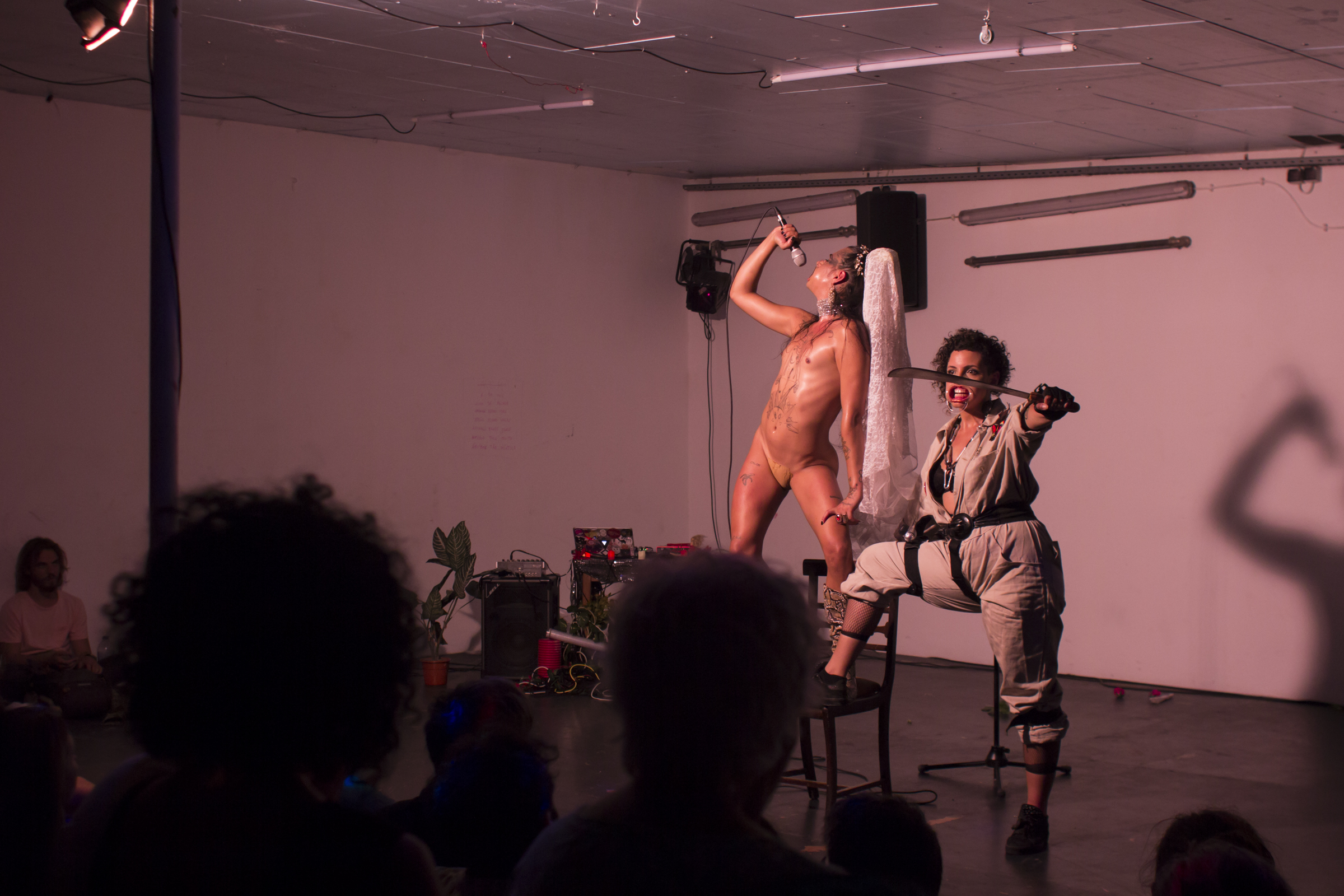
Trypas Corassão © Duda Affonso
É o caso de Tita Maravilha, actriz, performer e cantora que se mudou de Brasília para Lisboa “numa perspectiva de fuga”. “É como se estivesse lutando lá, mas noutro lugar.” Juntamente com Ágatha Barbosa (aka Cigarra), DJ, produtora e responsável pela editora Hystereofônica, Tita dispara essa luta através das Trypas Corassão – “um grito de duas mulheres brasileiras e latino-americanas” que ecoa entre a música, a performance e o teatro; entre a revolta e uma política do afecto, entre o empoderamento e uma poesia de vísceras e cicatrizes. Trypas Corassão é uma surra de talento e pensamento.
Apesar de gerar confronto e desconforto, Tita Maravilha considera que o trabalho da dupla “funciona muito bem em Portugal”. “Tenho sido mais aplaudida aqui [do que no Brasil], mas talvez seja também por causa de uma carência extrema de mulheres trans artistas nos circuitos da música e das artes performativas”, observa, sem deixar de referenciar artistas trans portuguesas como Odete e Aurora Pinho. “Aqui as pessoas estão sedentas de ouvir as vozes de artistas brasileiros LGBTQI, tanto no âmbito artístico como académico”, reforça o carioca Di Candido, produtor cultural, DJ e mestrando do ISCTE – Instituto Universitário de Lisboa.
Responsável pelas festas House of DiDi, no 49 ZDB, e Bee.on the Beat, nas Damas, Di Candido tem construído pontes entre Portugal e Brasil em várias frentes, mas sempre priorizando questões ligadas à negritude, às comunidades LGBTQI e aos movimentos anti-racistas. Membro da Batekoo, no ano passado ajudou a pôr de pé a primeira festa em Lisboa deste muito badalado colectivo negro e queer brasileiro (outras se seguirão), e está a colaborar na produção da próxima edição do Festival Política, cuja programação dará destaque a trabalhos de criadores brasileiros de lá e de cá, como a curta-metragem Negrum3, de Diego Paulino, ou a performance das Trypas Corassão.
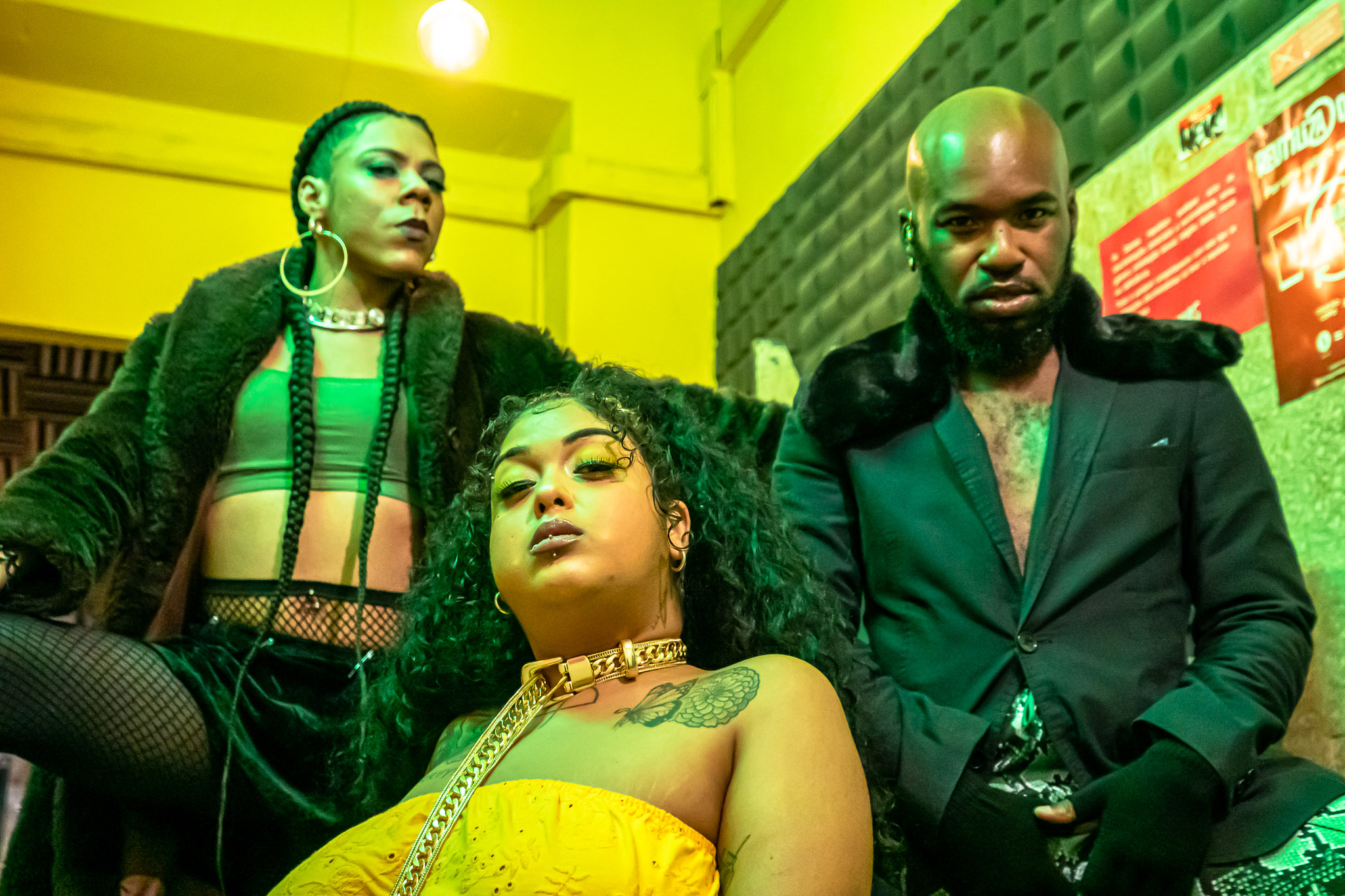
Bee on the beat © Ricardo Borges
O trabalho desta nova geração de artistas brasileiros residentes em Portugal é marcadamente politizado, tal como o dos seus pares do outro lado do Atlântico. Entrelaça-se, muitas vezes, com o activismo político interseccional, o que tem trazido reforços e novas perspectivas aos movimentos activistas portugueses – isto numa nação de brandos e brancos costumes, em que a maioria da população ainda vive na ilusão de que Portugal não é um país racista, mesmo depois de ver nos telejornais uma cidadã negra a ser brutalmente agredida por um polícia, ou um jogador de futebol a sair a meio do jogo por estar farto de levar com insultos racistas vindos das bancadas. “Portugal ainda não está pronto para ouvir ‘você é racista’, ‘você é xenófobo’, mesmo entre os mais engajados”, diz Cigarra, das Trypas Corassão.
“A gente tenta desenvolver uma nova forma de fazer política cá e influenciar a malta mais nova, mesmo dentro de um campo de actuação artística”, explica Di Candido, referindo que o movimento negro em Portugal tem também crescido por causa de imigrantes brasileiros. “Não somos os reis da verdade, mas podemos contribuir para a construção de uma nova sociedade, que agora também é a nossa.”
O facto de a produção de pensamento sobre feminismo interseccional, questões raciais, colonialismo ou vivências LGBTQI no Brasil estar a anos-luz da que é realizada em Portugal não é, para Cigarra, propriamente “um privilégio”, mas sim “uma questão de sobrevivência” num país onde a violência contra mulheres, negros e população LGBTQI atinge proporções alarmantes (e que agora é legitimada e abençoada pelo governo Bolsonaro). “Temos de entender como a gente chegou aonde chegou e como trazer esse conhecimento para cá, sabendo ouvir também.”
Activismo em várias frentes
Desde há alguns anos que artistas e militantes brasileiros estão “a influenciar o activismo” e a contracultura das principais cidades portuguesas, nota Cyntia de Paula. Inclusive através de grupos como o Coletivo Andorinha – Frente Democrática Brasileira de Lisboa, o NARP – Núcleo Anti-Racista do Porto e várias plataformas feministas interseccionais. No ano passado, a residência da Mídia Ninja em Lisboa, com a sua primeira casa comunitária internacional, veio trazer um novo fôlego a esta relação. Passaram por cá nomes como Caetano Veloso, Jean Wyllys, Petra Costa, Leila Rocha Guarani Nhandeva ou Dríade Aguiar, além de se terem estabelecido várias parcerias com activistas e artistas portugueses afrodescendentes.
Criar alianças com a comunidade afrodescendente portuguesa é, aliás, uma das linhas de acção de vários artistas e produtores culturais brasileiros. “Sobretudo entre os jovens, temos tido uma influência muito forte na mobilização dos corpos afrodescendentes portugueses”, acredita Di Candido, que colabora com a produtora de conteúdos AfroMary, além de ter integrado a equipa da 7ª conferência bianual Afroeuropeans. Tal como Di, também o colectivo e produtora Nêga Filmes & Produções procura conectar, com um pé em Portugal e outro no Brasil, a produção artística de várias diásporas africanas, sobretudo nas áreas do cinema, poesia e fotografia.
“A nossa intenção é estabelecer vínculos, pontes e redes com pessoas que vivem este mundo a partir da experiência de habitar um corpo negro”, afirma a artista visual, educadora e activista Maíra Zenun, responsável pela Nêga Filmes juntamente com a poeta e professora Luzia Gomes, que representa a produtora no Brasil.
“Em Portugal há uma importante produção audiovisual sendo feita por pessoas negras que estão atentas à questão estrutural do racismo. Nós temos laços profundos de parceria e troca com realizadoras e realizadores negros que habitam connosco neste território”, assinala Maíra, que, em 2016, fundou a Mostra Internacional de Cinema na Cova da Moura (bairro na Amadora cuja população é maioritariamente negra) dedicada, precisamente, ao cinema negro contemporâneo.
Esta arte turbinada pelo activismo também contamina o modo como se organizam festas (incluindo o Carnaval). Com a House of DiDi e a Bee – e cruzando música, performance e expressões artísticas híbridas –, Di Candido quer trazer para a noite lisboeta mais vozes e corporalidades queer, negras e diversas, dando “suporte” a essas comunidades. No Porto, a Kebraku tem sido uma verdadeira lufada de ar fresco, servindo de tubo de ensaio para uma noite mais igualitária. “A minha ideia, quando vim para cá, era também divulgar um jeito diferente de curtir a festa, sem sexismo, sem preconceitos e com respeito. Era o que eu estava vivendo em São Paulo, em festas como a Pilantragi”, conta Rafael Henrique Victório, mais conhecido por DJ Farofa.
Farofa © Mariana Bastos
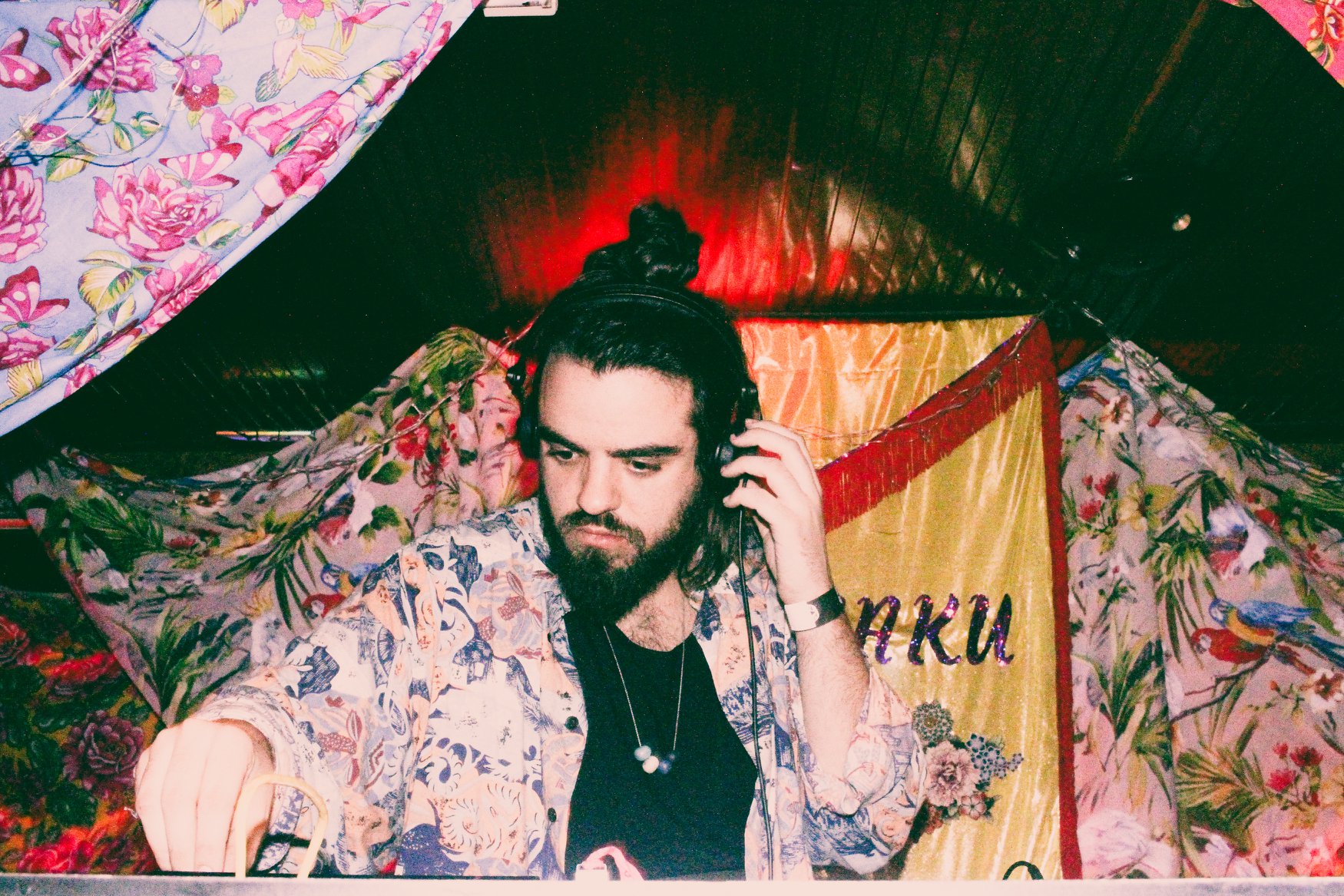
Farofa mudou-se para o Porto em 2014 com o objectivo de divulgar música brasileira. “Só trouxe discos de vinil na mala. 64 quilos de discos.” Hoje o cenário é bem diferente daquele que encontrou quando chegou. Não só a nível local como global. “DJs, produtores e músicos de todo o mundo começaram a olhar com outros olhos para as músicas ditas periféricas, Brasil incluído.” Aliado a isso, “a música brasileira contemporânea tem uma força muito grande na forma politizada como se posiciona, então o mundo quis olhar mais para isso
e passou também a curtir outros modos de fazer festas”, resume Farofa, que também tem dado uma mão na produção de concertos de músicos brasileiros de passagem pelo Porto.
Além da Kebraku, criou a TODA e a Batidão Baile Funk, esta última em conjunto com a produtora Pyrats. Em todas elas, procura abrir portas a DJs imigrantes, sobretudo brasileiros, e praticar uma política de preços acessíveis. Trata-se de encarar a noite “não como um negócio”, mas “como uma plataforma de arte, em que se abre espaço para artistas e para divulgar outras culturas.” Em Lisboa, partilham ideais semelhantes festas como a SOMA e a residência mensal dos Venga, Venga no Musicbox (um dos espaços que mais tem programado música brasileira, de forma continuada e regular). “A nossa ideia na SOMA foi também juntar vários artistas e colectivos latino-americanos e ajudarmo-nos uns aos outros”, assinala Cigarra, uma das organizadoras, que trouxe na bagagem anos de experiência acumulados em São Paulo com o colectivo de músicos, performers e artistas visuais Voodoohop.
Conexão Brasil-Portugal (e vice-versa)
Muitos imigrantes brasileiros criam projectos de raiz quando se instalam em Portugal. Mas há também quem traga para cá o que começou lá, readaptando-se a um novo panorama e aproveitando para estimular conexões entre os dois países. Thais Pimenta, que decidiu sair do Brasil “no dia em que Bolsonaro ganhou as eleições”, gere agora em Lisboa a agência de comunicação e assessoria que fundou em São Paulo, a Café8, virada para a área musical.
“Considero-me mais um ponto de apoio para artistas brasileiros que queiram vir para a Europa e de europeus que queiram ir para o Brasil”, explica Thais. De cá para lá, já trabalhou com a banda portuguesa PAUS e, na ponte inversa, com Filipe Catto, Rubel ou Guilherme Kastrup. Colabora ainda com vários projectos portugueses, como a produtora A Sul do Mundo e o festival Tremor, e brasileiros, como a plataforma Natura Musical, o festival No Ar Coquetel Molotov e o site Mapa dos Festivais. E diz acompanhar bem de perto eventos que investem nestas conexões, como o MIL, em Lisboa, e a SIM São Paulo.
Numa altura em que o governo de Bolsonaro intensifica a perseguição a artistas (um dos seus ódios de estimação) e acelera o desmantelamento da cultura no Brasil – através de cortes nos financiamentos, de actos de censura e descredibilização pública –, Thais Pimenta acredita que boa parte da música brasileira, “assim como todas as artes no Brasil”, estão “em alerta geral”.
“O meu grande propósito em auxiliar na ponte Brasil-Europa é ajudar a disseminar o que estamos vivendo por lá sob o actual governo”, refere. “Por mais que queiram negar a globalização – pelo menos essa é a premissa do nosso Ministro de Relações Exteriores – as conexões já estão feitas.”
Exemplo disso é o encenador e actor pernambucano Pedro Vilela, da plataforma TREMA!. Em 2018 apresentou a espectáculo Altíssimo no FITEI – Festival Internacional de Teatro de Expressão Ibérica, no Porto, cidade para onde se viria a mudar no ano passado, depois de ter ficado sem apoios para fazer o seu festival, o TREMA!, onde a reflexão política e social sempre teve um lugar central. A perda de financiamento foi a gota de água num cenário que já era hostil, sobretudo no que diz respeito às relações com as forças políticas locais. “Eu costumo dizer que as coisas pioraram, mas nunca foram maravilhosas. Antes [de Bolsonaro] era sobretudo uma conjectura precária a nível económico, particularmente quando se pensa no Nordeste do país, mas agora há censura e perseguição política. Isso está escancarado”, afirma o artista, que entretanto conseguiu reactivar o festival no Brasil.
Juntamente com os colegas da plataforma TREMA!, que também se mudaram para o Porto, Pedro Vilela tem repensado este projecto “como um agente de conexão entre Brasil e Portugal”. Está a pôr isso em prática no trabalho de curadoria que desenvolve na Central Eléctrica, espaço da companhia Circolando, através de apresentações, debates, workshops e residências. Por lá já passaram nomes das artes performativas brasileiras como Maikon K, Janaina Leite e Alejandro Ahmed, e também criadores brasileiros a residir em Portugal, como Diego Bagagal. “É importante dizer que esses artistas têm trazido algumas questões que a gente tem de colocar na roda aqui em Portugal”, considera Pedro Vilela. Neste momento, o actor e encenador está em processo de criação de uma peça sobre o genocídio indígena.
Que futuro?
“Esta nova vaga de imigração é mais qualificada, mas continua a ter trabalhos muito precários, incluindo os artistas. Essas desigualdades estruturais permanecem”, assinala Cyntia de Paula. “Temos muitas queixas de artistas que recebem convites para trabalho não-remunerado, como se isso pagasse a renda”, acrescenta a directora da Casa do Brasil, adiantando que estão a pensar promover em Lisboa “uma espécie de Virada Cultural” (festival de cultura contemporânea em São Paulo) com artistas imigrantes.
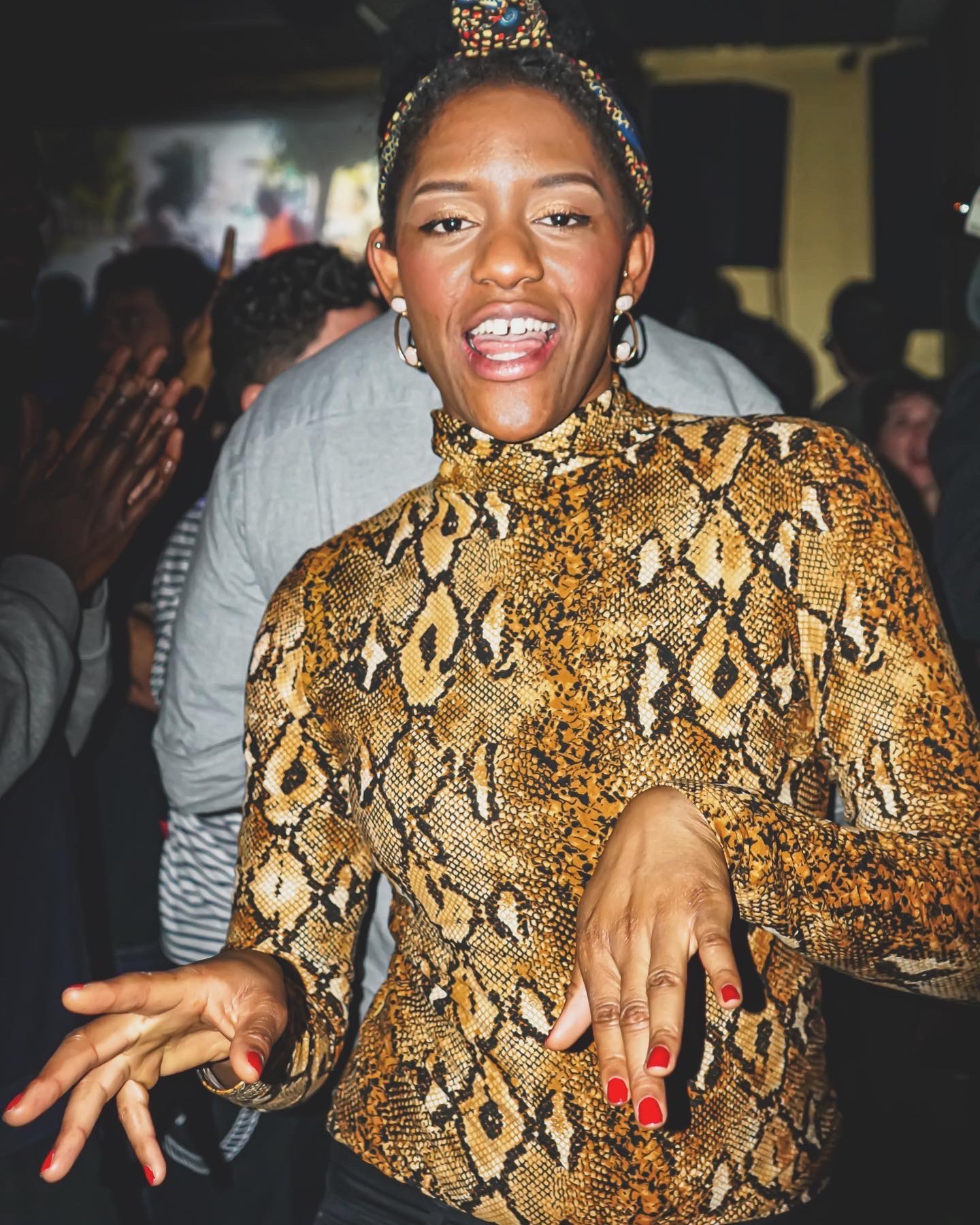
© Ricardo Borges
Di Candido diz ainda que é preciso abrir mais espaço para “artistas dissidentes brasileiros”, algo que ele tem feito na festa Bee. “O samba e o forró são muito difundidos aqui, em casas como a Todo o Mundo, Bartô e Titanic Sur Mer, mas e as outras coisas?” Para as Trypas Corassão, é preciso que a circulação destes criadores vá além da cena underground e do “circuito de festa”. “Falta sinergia [entre portugueses e brasileiros] lá em cima. Nós também queremos chegar ao lado mais institucional”, afirma Cigarra. “O nosso desejo, enquanto Trypas Corassão, é também atingir o lugar do teatro com uma peça travesti”, reforça Tita Maravilha, que no início de Março se estreou no Teatro São Luiz com o espectáculo Mina, de Carlota Lagido.
Estejam onde estiverem, cheguem aonde chegarem, importa que estes corpos – e as suas subjectividades e lutas políticas – não sejam capitalizados, apropriados, fetichizados. Sobretudo por programadores do tecido mais institucional, numa altura em que fica bem na fotografia programar autores que se debruçam sobre temáticas feministas, LGBTQI e anti-racistas, particularmente os que vêm de países cujos governos querem, orgulhosamente e doentiamente, aniquilar tudo isso. “Temos de entender onde estamos a colocar os nossos corpos, para que não sejamos um fantoche ou um troféu de quem nos quer utilizar apenas para preencher as suas agendas”, comenta Di Candido. Tem de existir um interesse-não-interesseiro, um esforço genuíno e sustentado para mudar estruturas sociais e epistemológicas. “É o grande momento de pessoas trans na arte”, nota Tita Maravilha, e isso é “uma faca de dois gumes”. “Pode existir uma fetichização problemática, sim, mas, ao mesmo tempo, este é o nosso momento.”
“Com o nosso projecto não queremos só estar na cena, queremos criar uma cena”, declara Cigarra. E Portugal, tanto o circuito cultural como a sociedade em geral, só tem a ganhar com isso. Novos olhares, ritmos e “escrevivências” (citando Conceição Evaristo). Outras possibilidades e pluralidades, outros repertórios de luta, resistência e afecto que estes artistas brasileiros nos trazem. Elas, eles e elxs estão aqui. Como diz Tita Maravilha: “aguente se puder”.
English Version
In 2019, contemporary Brazilian artistic production barged in like never before. In larger quantity and diversity, with great urgency and insurgency, in underground locations, in the institutional circuit and in the academic sphere; from music to literature, from theater to dance, from visual arts to cinema. We saw people (the list is long, very long) like MC Carol, the most punk “funkeira” of the lot, singers and songwriters Bia Ferreira and Linn da Quebrada, who came to Portugal more than once in the same year, Conceição Evaristo and Sueli Carneiro, major figures in Afro-Brazilian literature and the Brazilian black movement, or, in the performing arts, Grace Passô, Cia. Hiato, Alice Ripoll, Anti Status Quo Companhia de Dança e Coletiva Ocupação, with powerful and deeply inspiring performances.
All of this happened in a particularly vibrant and symbolic context: one of struggle and resistance against Jair Bolsonaro’s far-right regime, but also at a time when there are more and more Brazilians living in Portugal (over 100 000). Among these immigrants is an artistic and politically active class that has been growing in the Portuguese independent cultural circuit, with a focus on Lisbon and Porto, with increasing intensity and presence over the last two years, and reinvigorating it with other bodies, other languages and knowledge, other pluralities and possibilities.
“Brazilian immigration in Portugal is now more diverse than ever”, notes Cyntia de Paula, president of Casa do Brasil, a non-profit association based in Lisbon promoting the rights of immigrant communities since 1992. The new wave of migration, which was accentuated in 2018, is composed of “different profiles and social classes” (both pro and anti-Bolsonaro), including gold visas, retirees, small and medium entrepreneurs, students, workers looking for better living conditions and “many artists”. “Artists come to us every day looking for a space and we are always receiving emails from artists still in Brazil who would like to move here and who want to know how they can get on the circuit here,” says Cyntia de Paula.
According to the president of Casa do Brasil, most of Brazilian artists who have recently arrived in Portugal are reportedly anti-Bolsonaro. “They come here also to continue to resist through art.”

This is the case of Tita Maravilha, an actress, performer and singer who moved from Brasilia to Lisbon “in a perspective of escape”. “It’s like I’m fighting there, but somewhere else.” Together with Ágatha Barbosa (aka Cigarra), DJ, producer and responsible for the label Hystereofônica, Tita triggers this fight through Trypas Corassão – “a cry of two Brazilian and Latin American women” that echoes between music, performance and theater; between revolt and a policy of affection, between empowerment and a poetry of guts and scars. Trypas Corassão is an explosion of talent and thought.
Even though the work of the duo has been generating confrontation and discomfort, Tita Maravilha considers that it “works very well in Portugal”. “I have been more applauded here [than in Brazil], but perhaps it is also because of an extreme shortage of trans women artists in the circuits of music and performing arts”, she observes, while mentioning Portuguese trans artists like Odete and Aurora Pinho. “Here people are thirsty to hear the voices of Brazilian LGBTQI artists, both in the artistic and academic spheres”, reinforces Di Candido, a cultural producer, DJ and master’s student at ISCTE – Instituto Universitário de Lisboa.
Responsible for the House of DiDi parties, at 49 ZDB, and Bee.on the Beat, in Damas, Di Candido has been building bridges between Portugal and Brazil on several fronts, but always prioritising issues related to blackness, LGBTQI communities and anti-racist movements. A member of Batekoo, he helped last year to set up the first party in Lisbon of this very popular black and queer Brazilian collective (others will follow). He is also collaborating in the production of the next edition of the Festival Política, whose program will highlight works from Brazilian creators over there and over here, such as the short film Negrum3, by Diego Paulino, or the Trypas Corassão performance.

Bee on the beat © Ricardo Borges
The work of this new generation of Brazilian artists residing in Portugal is markedly politicised, as is the work of their peers on the other side of the Atlantic. It is often intertwined with intersectional political activism, which has strengthened and brought new perspectives to Portuguese activist movements – in a nation of mild and white habits, in which the majority of the population still lives in the illusion that Portugal is not a racist country, even after watching on the news a black citizen being brutally beaten by a police officer, or a football player leaving mid-game because he was fed up with taking racist slurs from the stands. “Portugal is not yet ready to hear ‘you are racist ’,‘ you are xenophobic ’, even among the most engaged,” says Cigarra, from Trypas Corassão.
“We try to develop a new way of doing politics here and influence the younger crowd, even in the field of artistic performance”, explains Di Candido, referring that the black movement in Portugal has also grown because of Brazilian immigrants. “We are not the kings of truth, but we can contribute to the construction of a new society, which is now also ours.”
The fact that the production of ideas on intersectional feminism, racial issues, colonialism or LGBTQI experiences in Brazil is light years from what is done in Portugal is not, for Cigarra, properly “a privilege”, but “a question of survival” in a country where violence against women, blacks and the LGBTQI population reaches alarming proportions (and which is now legitimised and blessed by the Bolsonaro government). “We have to understand how we got to where we are and how to bring this knowledge here, knowing how to listen as well.”
Activism on several fronts
For some years now, Brazilian artists and activists have been “influencing activism” and counterculture in the main Portuguese cities, notes Cyntia de Paula. Including through groups such as Coletivo Andorinha – Brazilian Democratic Front of Lisbon, NARP – Anti-Racist Nucleus of Porto and several intersectional feminist platforms. Last year, Mídia Ninja’s residence in Lisbon, with its first international community house, brought a new breath to this relationship. Names like Caetano Veloso, Jean Wyllys, Petra Costa, Leila Rocha Guarani Nhandeva or Dríade Aguiar passed through here, and several partnerships with activists and Portuguese artists of African descent were established.
Creating alliances with the Portuguese Afro-descendant community is, in fact, one of the lines of action of several Brazilian artists and cultural producers. “Especially among young people, we have had a very strong influence on the mobilisation of Portuguese Afro-descendant bodies”, believes Di Candido, who collaborates with content producer AfroMary, and was part of the team attending the 7th biannual Afro-European conference. Like Di, the production collective Nêga Filmes & Produções also seeks, with one foot in Portugal and the other in Brazil, to connect the artistic production of several African diasporas, especially in the areas of cinema, poetry and photography.
“Our intention is to establish bonds, bridges and networks with people who live this world in a black body”, says visual artist, educator and activist Maíra Zenun, responsible for Nêga Filmes together with poet and teacher Luzia Gomes, who represents the collective in Brazil.
“In Portugal, there is an important audiovisual production being made by black people who are aware of the issue of structural racism. We have deep ties of partnership and exchange with filmmakers and black filmmakers who live with us in this territory, ”says Maíra, who, in 2016, founded the International Film Festival in Cova da Moura (a neighborhood in Amadora whose population is mostly black) dedicated, precisely, to contemporary black cinema.
This activism-fueled art also contaminates the way parties are organized (including Carnival). With House of DiDi and Bee – mingling music, performance and hybrid artistic expressions –, Di Candido wants to bring to Lisbon´s night scene more voices and queer, black and diverse bodies, giving “support” to these communities. In Porto, Kebraku has been a real breath of fresh air, serving as a test tube for a more equal nightlife. “My idea, when I came here, was also to promote a different way of enjoying a party, without sexism, without prejudice and with respect. This was my experience in São Paulo, at parties like Pilantragi”, says Rafael Henrique Victório, better known as DJ Farofa.

Farofa moved to Porto in 2014 with the aim of promoting Brazilian music. “I only brought vinyl records in my suitcase. Sixty-four kilos of records”. Today the context is quite different from the one he found when he arrived. Not only locally but also globally. “DJs, producers and musicians from all over the world started to look with a different eye at the so-called peripheral music, including Brazilian music.” Also, “the strength of contemporary Brazilian music stems from its politicised positioning, so the
world wanted to look at it more and also started to enjoy other ways of partying”, summarises Farofa, who has also lent a hand in the production of concerts by Brazilian musicians passing through Porto.
In addition to Kebraku, he created TODA and Batidão Baile Funk, the latter together with promoter Pyrats. In all of them, he seeks to open doors to immigrant DJs, especially Brazilians, and to apply an affordable pricing policy. It is about seeing the night “not as a business”, but “as an art platform, in which there is a space for artists, and aimed at spreading other cultures.” In Lisbon, parties like SOMA and the Venga, Venga monthly residency on Musicbox (one of the spaces with the most Brazilian music programmed, on a continuous and regular basis) share similar beliefs. “Our idea at SOMA was also to bring together several Latin American artists and groups and help each other”, points out Cigarra, one of the organisers, who brought years of experience accumulated in São Paulo with the collective of musicians, performers and visual artists Voodoohop.
Brazil-Portugal connection (and vice versa)
Many Brazilian immigrants create projects from scratch when they settle in Portugal. But some also bring over here what they have started over there, adapting to a new panorama and taking the opportunity to stimulate connections between the two countries. Thais Pimenta, who decided to leave Brazil “on the day that Bolsonaro won the election”, now manages in Lisbon the communication and press office agency that she founded in São Paulo, Café8, with a special focus on the musical area.
“I consider myself another point of support for Brazilian artists who want to come to Europe and for Europeans who want to go to Brazil”, explains Thais. Since then, she has worked with Portuguese band PAUS and, on the reverse bridge, with Filipe Catto, Rubel or Guilherme Kastrup. She also collaborates with several Portuguese projects, such as promoter and booking agency A Sul do Mundo and the Tremor festival, and Brazilians, such as the Natura Musical platform, the No Ar Coquetel Molotov festival and the Mapa dos Festivais website. And she says she closely follows events that invest in these connections, such as MIL, in Lisbon, and SIM São Paulo.
At a time when the Bolsonaro government is intensifying the persecution of artists (one of his pet hates) and accelerating the dismantling of culture in Brazil – through cuts in funding, censorship and public smears –, Thais Pimenta believes that good part of Brazilian music, “as well as all other forms of art in Brazil”, are “on high alert”.
“My great purpose in helping with the Brazil-Europe bridge is to help disseminate what we are living there under the current government,” she says. “As much as they want to deny globalization – at least that is the premise of our Minister of Foreign Affairs – the connections are already made.”
An example of this is the Pernambuco theater director and actor Pedro Vilela, from the TREMA! Platform. In 2018 he presented the show Altíssimo at FITEI – International Theater Festival of Iberian Expression, in Porto, where he moved last year, after having run out of support to make his festival, TREMA!, where political and social reflection has always been key. The loss of funding was the last straw in a scenario that was already hostile, especially with regard to relations with local political forces. “I usually say that things got worse, but they were never wonderful. Before [Bolsonaro] the economic circumstances were quite precarious, particularly in the Northeast region of the country, but now there is censorship and political persecution. This is wide open”, says the artist, who meanwhile managed to reactivate the festival in Brazil.
Together with colleagues from the TREMA! Platform, who also moved to Porto, Pedro Vilela has been rethinking this project “as an agent of connection between Brazil and Portugal”. He is putting this into practice in his curatorial work at Central Eléctrica, a space belonging to the Circolando theater company, through presentations, debates, workshops and residencies. Brazilian performing artists such as Maikon K, Janaina Leite and Alejandro Ahmed have already passed through here, as well as Brazilian creators residing in Portugal, such as Diego Bagagal. “It is important to say that these artists have brought up some questions that we have to disseminate here in Portugal”, considers Pedro Vilela. At this moment, the actor and theater director is in the process of creating a play about the indigenous genocide.
What future?
“This new wave of immigration is more qualified, but it continues to have very precarious jobs, including artists. These structural inequalities remain”, points out Cyntia de Paula. “We have a lot of complaints from artists who receive invitations to unpaid work, as if that paid the rent”, adds the director of Casa do Brasil, stating that they are thinking of promoting in Lisbon “a kind of Virada Cultural” (contemporary culture festival in São Paulo) with immigrant artists.

Di Candido also says that it is necessary to open more space for “Brazilian dissident artists”, something he has been doing at the Bee party. “Samba and forró are very widespread here, in venues like Todo o Mundo, Bartô and Titanic Sur Mer, but what about other things”? For Trypas Corassão, it is necessary that the circulation of these artists go beyond the underground scene and the “party circuit”. “There is a lack of synergy [between Portuguese and Brazilians] up there. We also want to get to the more institutional side”, says Cigarra. “Our wish, as Trypas Corassão, is also to reach the theater sphere with a transvestite play”, reinforces Tita Maravilha, who at the beginning of March debuted at Teatro São Luiz with the show Mina, by Carlota Lagido.
Wherever they are, wherever they go, it matters that these bodies – as well as their subjectivities and political struggles – are not capitalized, appropriated, fetishised. Especially by programmers from the more institutional fabric, at a time when it looks good in photography to program authors who focus on feminist, LGBTQI and anti-racist themes, particularly those who come from countries whose governments proudly and sickly want to annihilate all of that. “We have to understand where we are placing our bodies, to avoid becoming puppets or trophies for those who want to use us just to fill their schedules”, comments Di Candido. There must be a selfless, genuine and sustained effort to change social and epistemological structures. “It is trans people’s moment in the artistic sphere”, notes Tita Maravilha, and this is “a double-edged sword”. “There may be a problematic fetishisation, yes, but at the same time, this is our moment.”
“With our project we don’t just want to be on the scene, we want to create a scene”, says Cigarra. And Portugal´s cultural circuit and society in general, can only gain from it. New looks, rhythms and “writlivings” (“escrevivências”, quoting Conceição Evaristo). These Brazilian artists bring us possibilities and pluralities, other repertoires of struggle, resistance and affection. They are here. As Tita Maravilha says: “hold on if you can”.
/ Translation by Saoussen Khalifa
